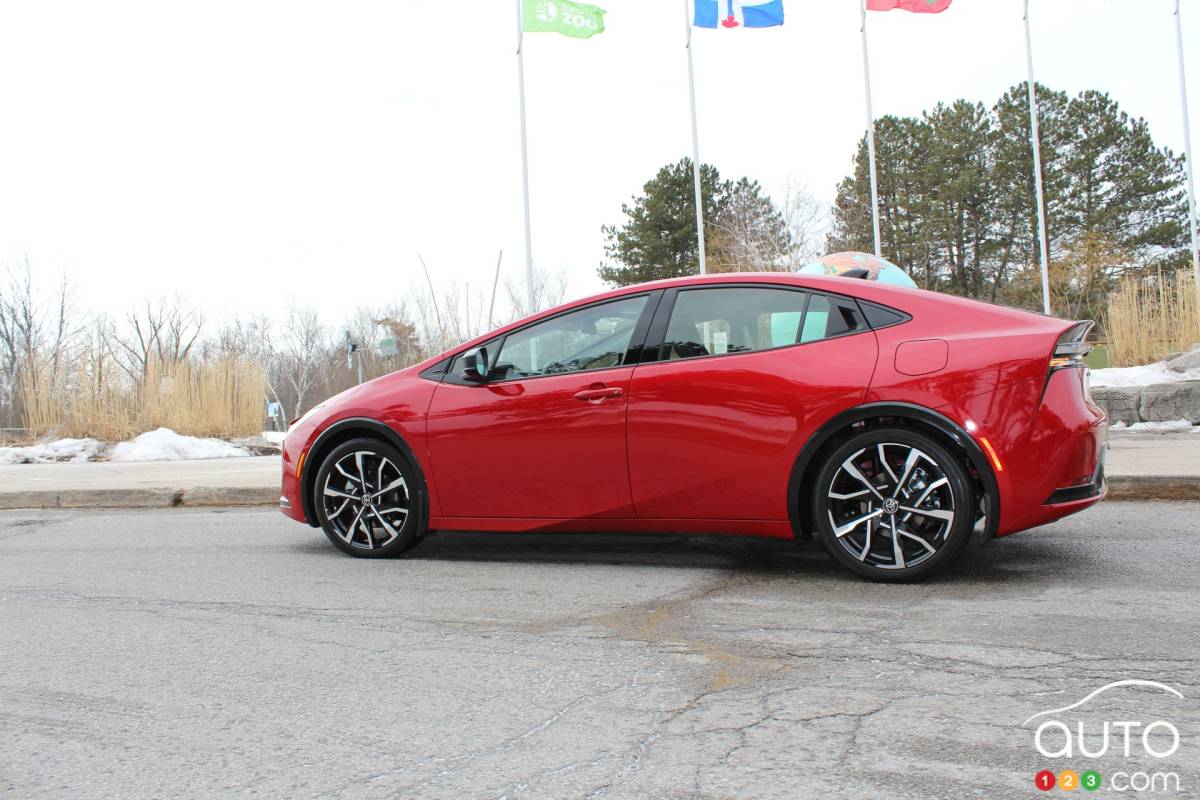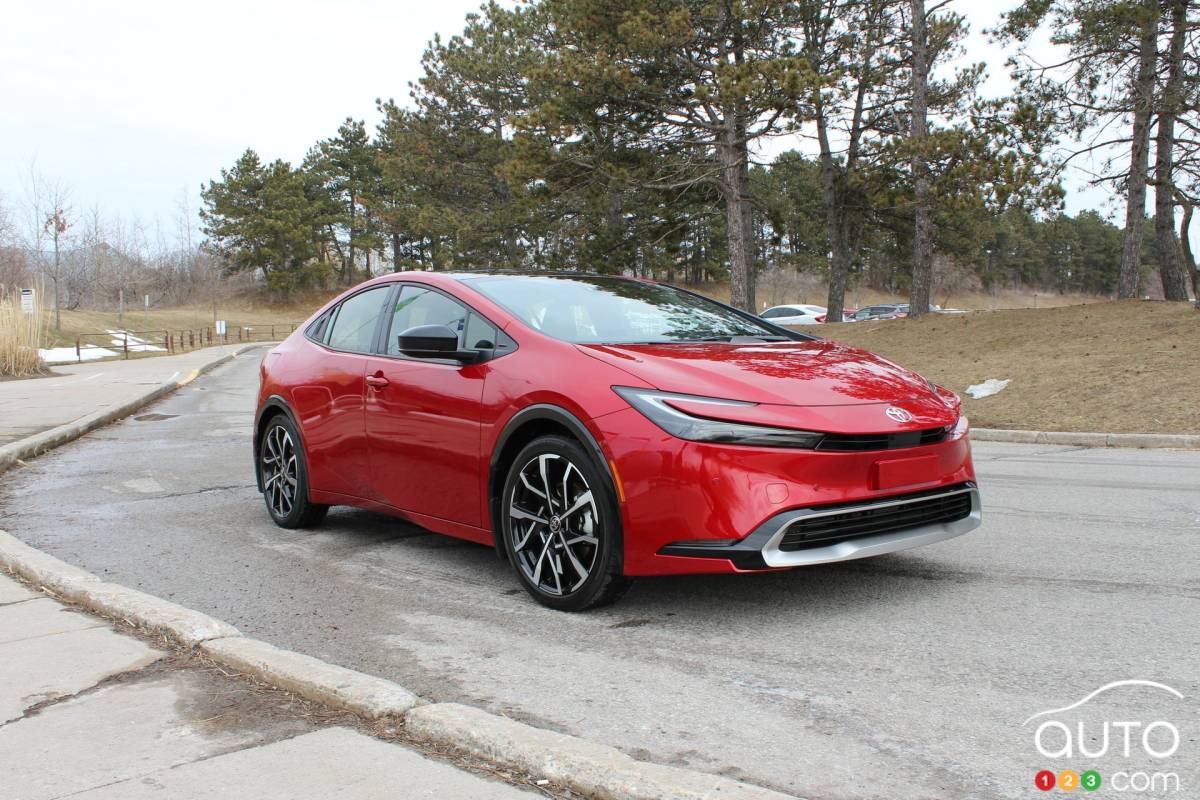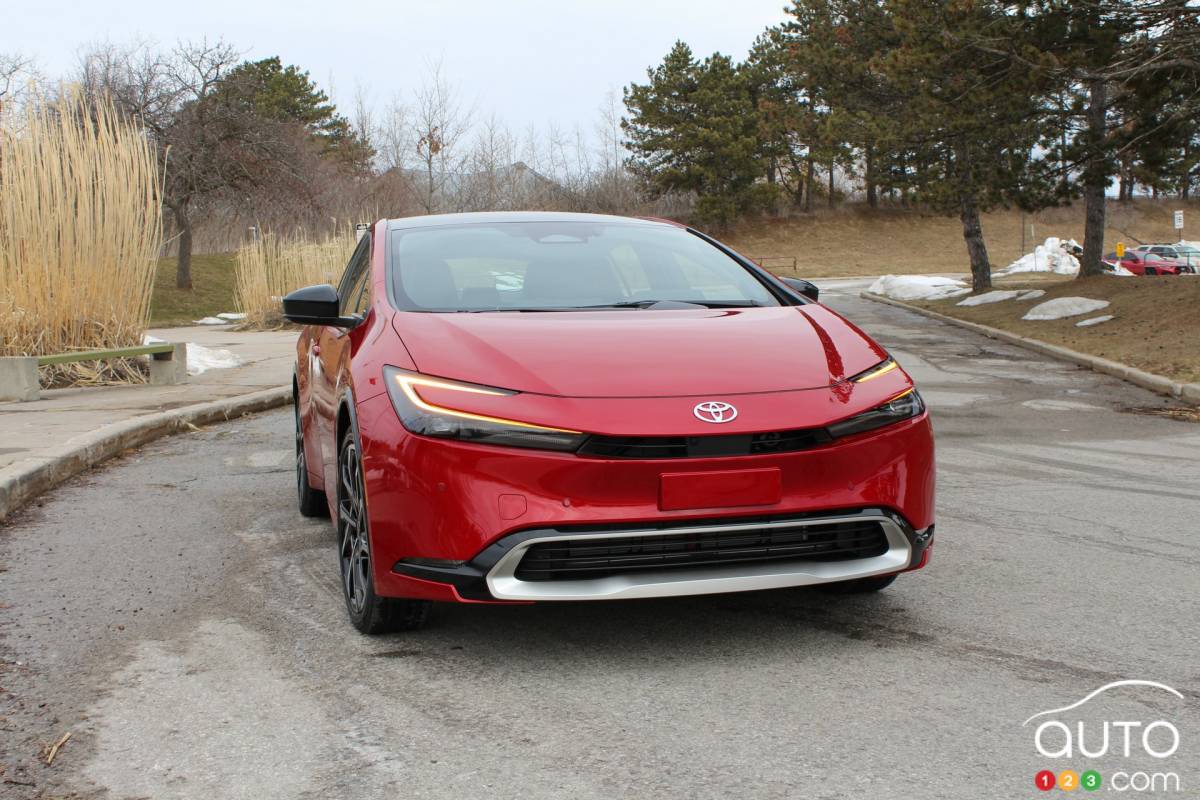• Auto123 got in a first drive of the transformed 2023 Toyota Prius Prime.
• Its looks draw praise, but the performance it delivers is no slouch either.
The Toyota Prius Prime is the plug-in version of the Japanese automaker’s ground-breaking hybrid car. Toyota revolutionized the hybridization market with the introduction of the Prius. A plug-in version with electric range and a larger battery was first introduced in November 2016 for the 2017 model-year.
Now, we have the new generation of that PHEV. We recently tested the 2023 edition of the Prius Prime as the Prius model reaches its fifth generation. We are in high anticipation of our first contact with the model, and by and large we were not disappointed.
What's new for the 2023 version?
Quite a lot, to say the least. The changes for the 2023 Prius Prime are significant and numerous. For starters, with a new 13.6 kWh battery, range increases from 40 to 72 km. This represents a 80-percent increase in electric range over the previous version of the model.
Another important upgrade is to the engine, which now develops 150 hp. Total combined power is 220 hp, 100 more than in the previous Prius Prime. Torque is also increased from 105 to 139 lb-ft, which allows the car to go from 0-100 km/h in 6.8 seconds, far ahead of the 10 (!) seconds of the previous generation. Welcome to the modern age, Prius Prime!
The exterior
More punch is one thing, but the model's new look is just as radically new and improved. The new Prius Prime is an eye-catcher on the road with its sporty and elegant new design. It's a far cry from the ugly duckling of the old version.
The car is now 50 mm shorter in height, but 20 mm wider and 25 mm longer than the previous generation. Its hammer-shaped nose (according to Toyota), lower roofline and wider rear end give it a sporty and aerodynamic look.
Whereas the previous editions of the Prius had their fans but also many detractors, this new design is far more universally loved by those who have seen it.
It's as if Toyota took a page from Tesla’s design book...
Strong points
- Styling front, rear, profile
- Light signature
Weak points
- A bit low
The interior
The 2023 Prius Prime offers an upscale and comfortable interior. The first screen you see is the small one behind the steering wheel that displays all the information related to speed, remaining range, fuel consumption and your economic driving performance with the EcoZone system. That system calculates your performance based on acceleration and braking and gives you an eco-driving score.
In the centre sits an 12.3-inch screen (on our XSE Premium version; it’s 8 inches on the SE base version). Below it are the climate control commands. Between the two front seats is a small sport-type gearshift lever. It's a far cry from the old shifter, which looked like something out of a pickup truck and was placed in the middle of the centre console. Next to the shifter is a slot for smartphones.
The seats are available in cloth or SofTex, depending on the trim. You'll find all the accessories you'd expect to find in a new vehicle like this. Rain-sensing windshield wipers, heated seats and steering wheels, starting in the SE version and ventilated in the Premium trim.
Overall impression: The interior of this new Prius Prime is quiet, comfortable and very well finished. The company’s sound engineers have thought of everything, even the tone for locking and unlocking the doors, so that it is pleasant to the ear.
Strong points
- Comfort
- Assembly quality
- Wirless Apple Carplay, Android Auto
Weak points
- Not the most spacious back row
Safety and technology
The 2023 Toyota Prius Prime is loaded with tech. First and foremost is the latest-generation Toyota Safety Sense suite (TSS 3.0). Safety features include a pre-collision system with pedestrian detection, lane departure warning with steering assist, dynamic radar cruise control, lane tracking assist, traffic sign detection assist and automatic high beams.
Proactive Driving Assist, the latest feature in the TSS lineup, uses the vehicle's camera and radar to gently slow the vehicle before a turn. This system complements the pre-collision system, which stops the vehicle if there is a danger of collision.
Another interesting feature is the Cross Traffic Alert. Using sensors and radar, your Prius will detect if another vehicle is approaching from the side. So at an intersection, it can warn you if it detects a vehicle moving into your path.
We did note one anomaly: during our drive, as we were looking for an address, several times an alert sounded in the vehicle and on the screen in front of the driver, indicating a lack of vigilance on the part of the driver. This evoked for us some of the other systems out there that can get a little too over-enthusiastic, shall we say.
On the multimedia front, the XSE Premium we drove had a JBL Premium audio system with eight speakers.
The drive
As we drove our new Prius mid-morning in the Toronto area, two major points stood out stood. First, the improved electric range of the vehicle.
Secondly, the average fuel consumption (officially given by Toyota at 4.5L/100 km). On this day, having only 40 km of electric range predicted from a battery charged to only 50 percent, we wanted to put the 220-hp gas engine to the test and see what kind of fuel economy it could achieve. So we put the vehicle in sport mode and deactivated the electric motor each time to use only the thermal engine.
After 65 km, the fuel consumption of our Prius was… 3.1L/100 km. We made this trip mainly on fast roads and on several occasions we accelerated hard. The 220-hp engine, while it’s no beast, responded very well to each pedal input without latency or moment of hesitation.
Most owners aren’t going to do that little test too often; more likely they’ll use one of the other two drive modes, Normal for an optimal balance of fuel economy and lively acceleration, or Eco mode for more energy-efficient driving by limiting engine power.
The Prius Prime is available in front-wheel drive only, while the regular Prius is available in Canada in four-wheel drive. Given the winters we have here, many buyers could turn to all-wheel drive to combine safety and economy.
Strong points
- More pleasant engine
- Power
- Fuel economy
Weak points
- Only with front-wheel drive
The final word
Toyota has done a good job with the new Prius Prime, transformed in so many ways. Even the most optimistic predictions might not have conjured up such improvements for this model compared to the previous generation. Not that the old Prius Prime wasn't efficient, but the new one has been improved in every way, including the engine of course, but also the pure electric range, on-board comfort and especially the look of the car.
Note that our test car was a U.S. model and had a solar roof. This roof, on a day of cloudy skies and with some light rain, gave us back 0.4 km of range. I imagine that under the summer sun it could deliver more. Unfortunately, the solar roof will not be available in Canada...
Conditions of the test drive
- Weather conditions: Cloudy with temperature around 5 degrees
- Type of road: North of the great Toronto
- Speed: Average between 70-80km/h
- Duration of the test: Half a day
Specifications sheet of 2023 Toyota Prius Prime SE
Specifications sheet of 2023 Toyota Prius Prime XSE
Specifications sheet of 2023 Toyota Prius Prime XSE Premium
Here are a few of your questions about the 2023 Toyota Prius Prime :
How much does the 2023 Prius Prime sell for?
There are three versions of the 2023 Prius Prime. The SE retails for $37,990, the XSE for $42,990 and the XSE Premium for $46,990.
Does the 2023 Prius Prime have all-wheel-drive?
Unfortunately not. For an AWD configuration, Canadian buyers will have to opt for the non-plug-in Prius model.
The competition
Kia Niro PHEV
Toyota Prius









